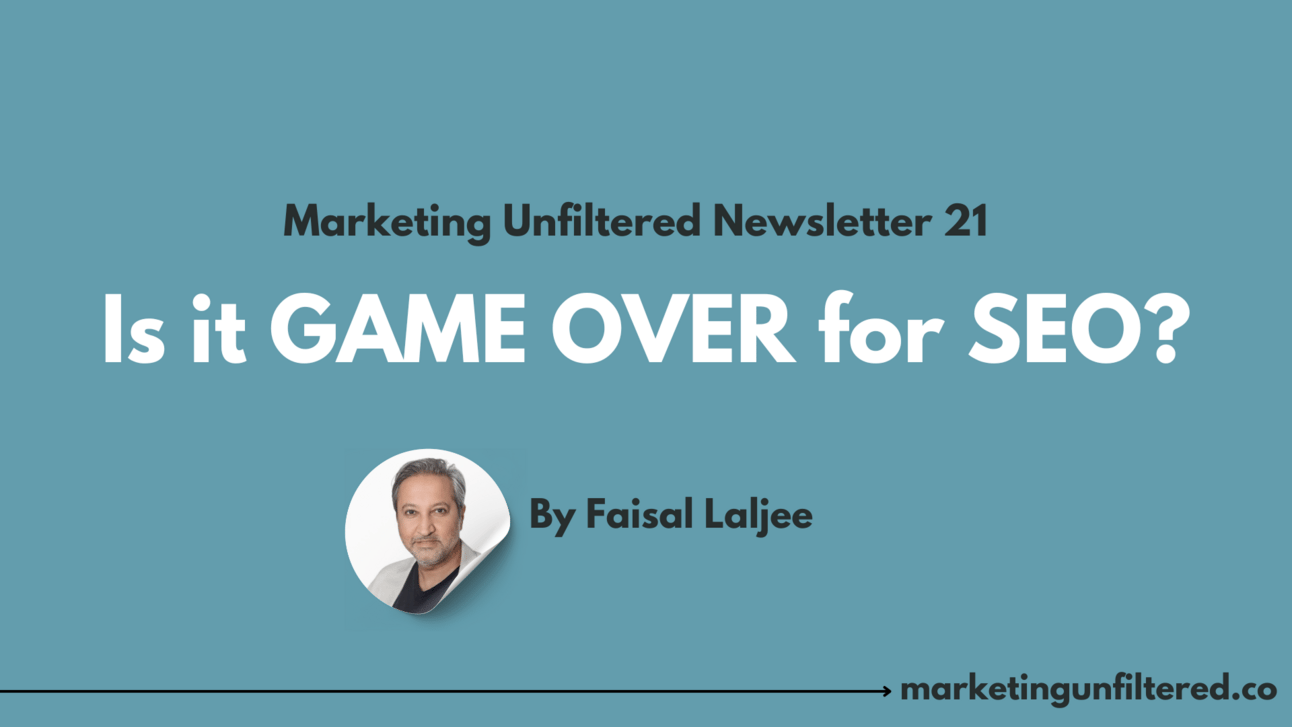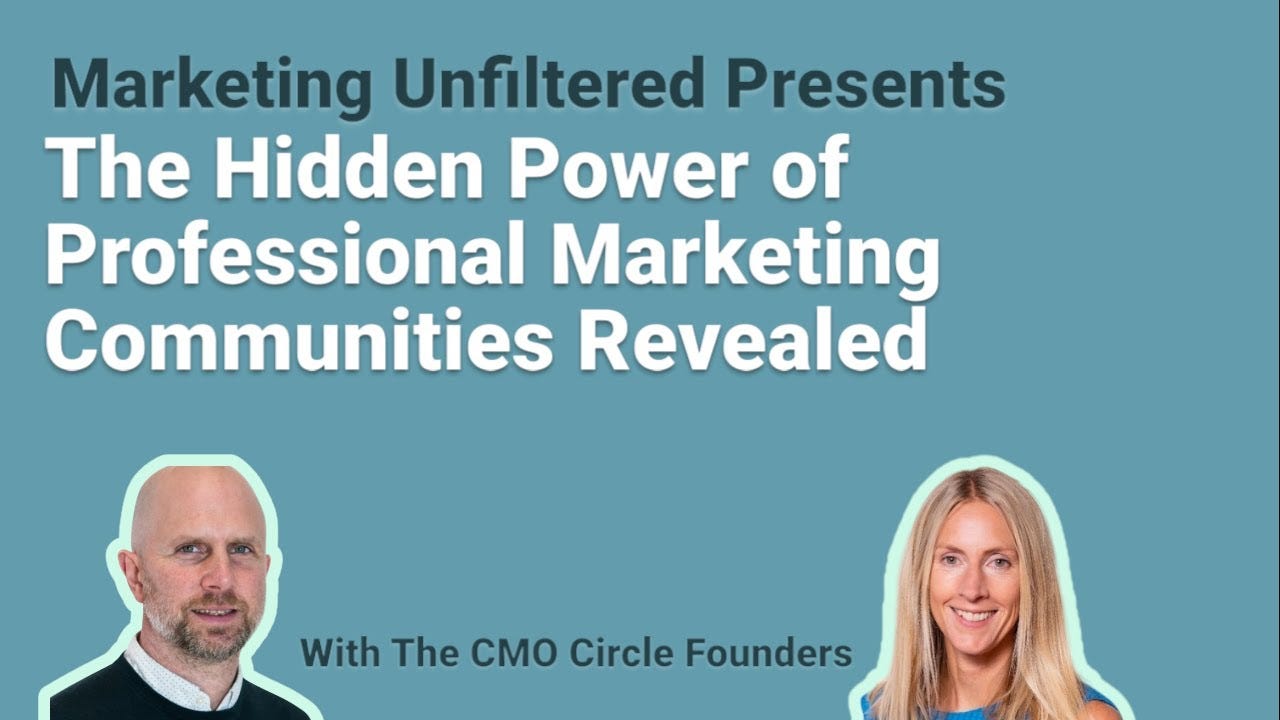Is it GAME OVER for SEO? ❌
Marketing Unfiltered 21 - Why AI Is About Writing For Your Customer Not Writing For Search Engine Rankings
Welcome back to Marketing Unfiltered and happy Friday!
Thanks for the great feedback and takes on Marketing Community from last week’s video interview and deep dive on the power of community for Marketing Leaders.
If you prefer WhatsApp over email to receive updates on, we now have a WhatsApp channel sharing our articles and occasional must reads and listens. Join below

This week we have Faisal Laljee contributing his first article for us, and he ponders…
Is it GAME OVER for SEO? ⛓️💥
In the world of digital marketing, the role of Search Engine Optimisation (SEO) has been paramount for over two decades. Largely considered a “free” source of traffic and revenue (which I would argue is hardly true), it is yet again, and not for the first time, facing scrutiny.
The new sheriff in town, AI, is the challenger this time.
There's growing discourse suggesting that traditional SEO may be on the decline.
My viewpoint on this is based on two themes.
1/ Google’s Evolution →
Google has been responsible for retiring the organic links for a long time. Slowly but surely, and few at a time, the beautiful blue links that stood out and shone bright in 2005 were first replaced with maps and local search, then additional Google Ads slots, then (YouTube) videos and snippets. And now with AI responses at the top, more SEO real-estate has been retired. Understandably, Google does not exist to send free traffic to anyone. It exists to make money for its shareholders. And with every single change over the last 15 years, Google has treated organic links like a step child. This reduction in organic visibility poses challenges for traditional SEO strategies. I see this trend continuing.
2/ Chatbot Search 🔎
This is where most people would argue against me, is that AI search is growing, and will start to encroach on traditional search. Naysayers can deny and the truth is I don’t have a crystal ball. So, this could be all just much ado about nothing. Yet,
I believe we have had examples of similar changes in the past.
Blockbuster went bust (pun intended) despite seeing competition coming from Netflix.
Nokia and Blackberry saw the threat of the modern smartphones, but couldn’t do anything to stop it and perished.
So, there is some precedent for my view. Now before you bring out your pitch forks, let me be clear - I am not suggesting that it is game over for Google.
I’m only suggesting, that it MAY be GAME OVER for SEO as a viable, Marketing channel for so-called “free” traffic.
The Rise of AI in Search 🤖
AI has been making significant inroads into various sectors, and search technology is no exception. Gartner, a leading research and advisory company, predicts that by 2026, traditional search engine volume will decrease by 25%, with search marketing losing market share to AI chatbots and virtual agents.
This shift is attributed to the growing preference for AI-driven conversational assistants, such as ChatGPT and Claude, which provide users with direct answers, reducing the need to sift through multiple search results.
Rand Fishkin’s research suggests 30% of conversations in ChatGPT are what we typically consider as having traditional search intent.
According to Sam Altman, ChatGPT gets a billion messages a day and a prompt has 8 messages on average. He therefore concludes that ChatGPT gets 38M prompts with search intent daily. It took Google 2.5 years to get to the same mark (you can derive that from the data by Search Engine Land).
ChatGPT is pacing with Google with regards to reaching 38M daily searches. And Google is much simpler to use, so I’d argue that maybe ChatGPT is slightly ahead. Imagine if OpenAI came out with a browser?
As things stand, according to Statista in 2027, 52% of all searches will be AI-based. So why am I bell-ringing here? I believe in light of these developments, there's a burgeoning argument for shifting focus from traditional SEO to AI Optimisation (AIO).
Time To Get Creative
I think businesses who rely on traditional SEO need to get creative.
Traditional link building through payment link farms, keyword stuffing and traditional SEO tactics are not going to cut it in the future. AI search is based on conversation. Content needs to evolve their tactics to the rules of AIO. It is not going to happen overnight, but it has already started.
I’ve posted on this subject, albeit a bit more controversially, much to the ire of SEO managers, SEO specialists SERP worshippers who speak in keywords, dream in backlinks, and treat Google’s algorithm updates like prophecies handed down from Mount Search.
But I don’t understand why they are not more excited about the changes that might be coming. No longer would they have to light an incense stick and pray to the Google gods every time their rankings drop. They will be free of the Googledom which has governed us for too long. But I digress.
Enter A-I-O
So how do you do AIO? It involves tailoring content to align with the algorithms of AI-driven search tools, ensuring that AI models accurately and favourably represent a brand. It encompasses optimising various aspects of a business's digital presence to be compatible with AI technologies, from chatbots to virtual assistants.
The rationale behind this shift is multifaceted:
Direct Answers: AI-driven search tools aim to provide immediate responses, reducing the reliance on traditional link-based search results. This necessitates content that is concise, relevant, and structured in a way that AI can easily interpret.
User Experience: With AI's ability to personalise interactions, businesses that optimise for AI can offer enhanced user experiences, leading to increased engagement and conversions.
Diversified Platforms: Unlike the past, where Google dominated the search landscape, there are now multiple AI-based search tools and long-tail applications. For instance, when using Gamma, I used the tool to find images for my slides. In the past, I would scour Google Images for such images.This diversification requires businesses to adapt their strategies to maintain visibility across various platforms.
Now, I will submit, that my calls for it being ‘Game Over for SEO’ may be a tad premature. And since I am trying (unsuccessfully) to be unbiased, I am going to make a counter argument against my view.
Adaptation of SEO Practices: SEO has historically evolved in response to technological advancements. The integration of AI can be viewed as another phase in its evolution, where SEO practices adapt to include optimisation for AI algorithms.
Trust and Reliability: Traditional search engines have established trust over the years. Users may still prefer traditional search results for certain queries, especially those requiring comprehensive information or multiple perspectives.
Commercial Viability: Businesses continue to invest heavily in SEO because it drives measurable results. The potential decline in search volume doesn't necessarily equate to the obsolescence of SEO but rather underscores the need for integrated strategies that encompass both traditional and AI-driven optimisation.
The Future Of SEO…
The discourse surrounding the future of SEO in the age of AI underscores the dynamic nature of digital marketing. While AI is poised to transform how users access information, it doesn't render traditional SEO obsolete. Instead, it calls for a balanced approach where businesses:
Embrace AI Technologies: Integrate AI tools to enhance content creation, user engagement, and data analysis.
Evolve SEO Strategies: Adapt SEO practices to align with the functionalities of AI-driven search tools, ensuring content remains discoverable and relevant.
Prioritise User Intent: Focus on understanding and fulfilling user intent, whether through traditional search or AI interactions, to maintain and grow digital presence.
So, while AI is reshaping the search landscape, SEO consultants, including clickbait connoisseurs, meta tag monks and backlink hoarders should be thinking of evolving their SEO strategies into AIO strategies.
It may not be Game Over for SEO yet, but then again, Kodak thought digital photography was just a flash in the pan despite owning the patent in 1977…Turns out, they were the ones left overexposed.
» What do you think?
Is Google and the SEO industry in evolution or is it being swallowed by the AI revolution?
Hit reply and let us know what your thoughts are
Connected with Faisal
On LinkedIn Or On His Website
A reminder if you missed last week’s interview enjoy ⬇️


The Hidden Power of Professional Marketing Communities Revealed - By The CMO Circle
Thanks and have a great weekend
Danny, Harry & The Marketing Unfiltered Contributors

